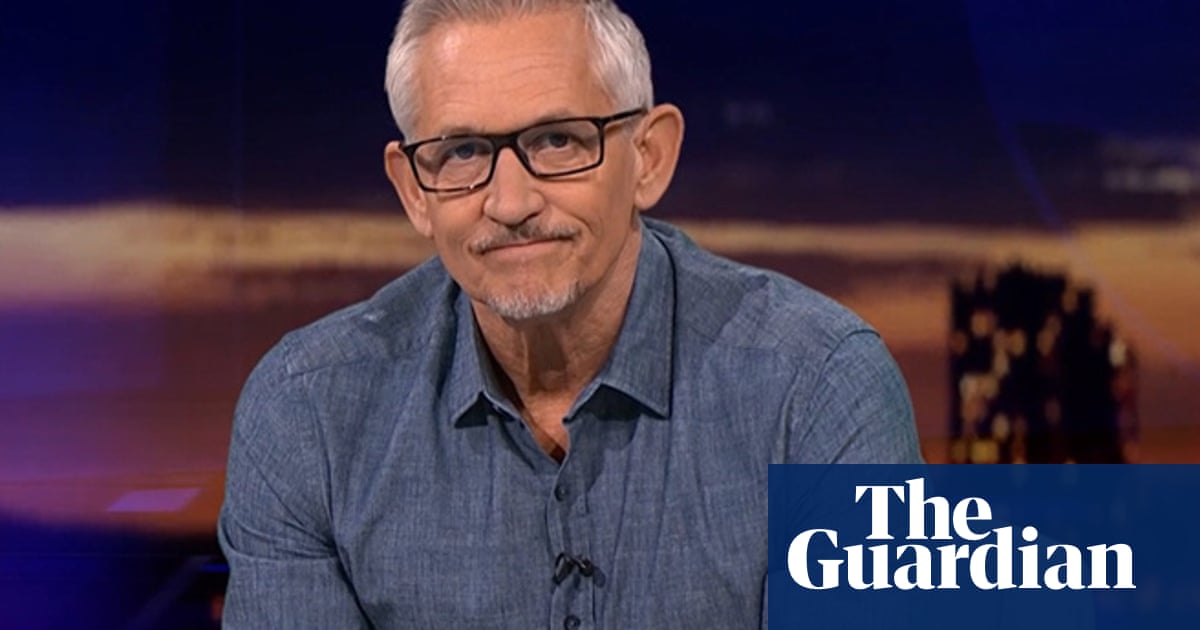Gary Lineker bade farewell toMatch of the Dayand his career at the BBC on Sunday night in the only appropriate manner: with a montage.
There were deep breaths, noises off, the checking of notes. There were tears and celebrations. There was Bobby Robson and Johan Cruyff. There were tributes from colleagues, peers, friends and family and an invitation to “go gallivanting” from Gazza.
“You don’t believe it but you will be missed,” said Pep Guardiola.
The 64-year-old largely held it together as he was taken down memory lane and ushered towards the exit door of the BBC’s top sports programme after 26 years of hosting. Only a sniffle betrayed his deeper feelings as he signed off for the last time. “Rather like my football career, everyone else did the hard work and I got the plaudits”, he said. “It’s been utterly joyous.”
Lineker has often described the opportunity to be a custodian of a programme he himself had grown up watching as “a privilege”. In truth, the former England captain’s stint as presenter dwarfs that of every other host. From David Coleman to Des Lynam, the host of Match of the Day has also been the face of the BBC’s sports programming and Lineker continued that tradition, but only his presence has been consistent across an entire generation.
After an initial stint as a pundit, Lineker’s presenting debut came on 7 August 1999. He introduced himself with a Lynam-esque moment of fourth-wall breaking. “Hey, tell you what, football’s back,” he said, before adding: “Any good? Did I get the job?”
His first match was Chelsea at home to promoted Sunderland, a thrashing led by Gianfranco Zola; his punditry panel Alan Hansen and Trevor Brooking.
Twenty-six years later and Lineker saw out his last 90 minutes of action and analysis in the company of Alan Shearer and Micah Richards. Both men are bigger, louder and snappier than their predecessors. They also work with Lineker all week long as part of The Rest Is Football, the hit podcast produced by Lineker’s Goalhanger studio. There, their personalities are given looser rein and banter gushes freely. The more mannered versions of the trio on MOTD can seem a little awkward by comparison.
Over the years Lineker found a distinctive voice as a broadcaster, conveying his enthusiasm for the game while adopting an avuncular approach to the athletes he was watching. He also indulged his fondness for wordplay and made many deprecating references to the achievements of his career.
His boyish looks endured for decades, his ageing betrayed only by his whitening hair. In 2015 he agreed to present MOTD in “just my undies” if the team he had once played for and always supported, Leicester City, won the Premier League. The Foxes duly pulled off the miracle and Lineker half-honoured his commitment: the white bloomers were more shorts than pants.
At that point in his career it was as close to controversy as Lineker had come. The player who never received a yellow card had become the good guy host, even-handed in his observations and gentle in his humour. But his pants pledge came via a post on Twitter and Lineker’s social media activity was to change the perception the public had of him.
He used Twitter to articulate his personal political views. His support for refugees brought attacks from the press and strangers into his home. Two years ago, criticism of the previous government’s language on asylum led to debates over impartiality and a brief suspension, only for Lineker’s pundit peers to walk out in solidarity.
Scrutiny of Lineker’s activity away from the studio has only grown since, at the same time as his independence from the BBC has deepened. The decision that Lineker would begin to step away from his BBC responsibilities was made last autumn, with the promise of a last dance at the men’s World Cup next summer. Lineker’s decision two weeks ago to repost content relating to the Gaza conflict that contained an antisemitic symbol then put an end to plans for an extended farewell.
“It wasn’t meant to end this way,” was how Lineker opened his final show, but there was to be no confessional. Of course it was a set up for a joke. “With the title race over, the Champions League was all we had left to talk about,” said Lineker as Richards grimaced keenly, but the camera didn’t linger.
As ever with a show that is edited with military precision, the match action had to be cued up. “We’ll take it in table order,” Lineker said. The show rolled on.
There were little chuckles at the prospect of free pints at Shearer’s Bar at St James’ Park and a recital of law 12 relating to the control of the ball in a goalkeeper’s hand. The Chelsea defender Levi Colwill was compared to a “prime Lineker in the box” by Richards and giggles were had over unrevealed remarks relating to Sunderland made by Shearer in the green room.
There was a graphic that got the West Ham manager wrong and Lineker momentarily confused Brighton and Bournemouth. It was all as familiar and as comforting as a warm bath. Then, finally, the plug was pulled.
